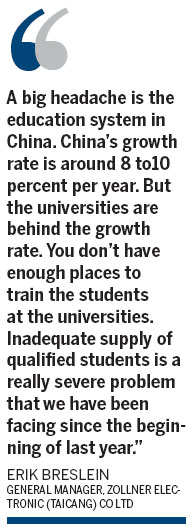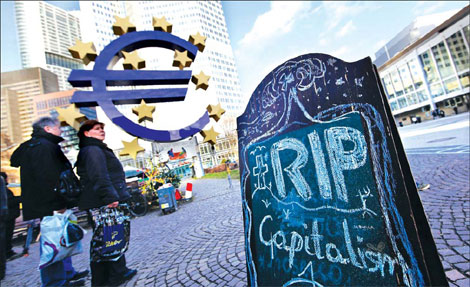German firms seeking growth in China
Updated: 2012-02-06 07:57
By Shi Jing (China Daily)
|
|||||||||||
|
The euro symbol outside the headquarters of the European Central Bank. The debt crisis has seen many European companies shift their focus on expansion to China. [Simon Dawson / Bloomberg] |
|
Holiday decoration products displayed at the 110th China Import and Export Fair in Guangzhou, Guangdong province. Some German companies are complaining their exports from the Chinese mainland have been affected by the rising value of the yuan. [Forbes Conrad / China Daily] |
Eastern expansion is the name of the game for firms as crisis hits Europe
SHANGHAI - Back in his home town of Essen in North Rhine Westphalia, Erik Breslein was made to feel like a folk hero, telling stories of optimism, growth and expansion in a distant land that were in sharp contrast to the tales of gloom and doom which have prevailed in a continent troubled by sovereign debt problems, credit crisis and soaring unemployment.
Of course, Breslein was well aware of the problems that beset Europe. But stationed in Taicang, a small town in Jiangsu province that is near metropolitan Shanghai, he and many other German executives in this enclave of German industrial enterprises have been too busy ramping up production at their respective facilities to pay too much attention. "We are thinking of nothing but expanding and expanding," recalled Breslein, general manager of Zollner Electronic (Taicang) Co Ltd.
His problem was to find the most cost-effective source of funding to build new factories and buy the latest machinery. Funding is becoming even more acute in 2012 when European banks, their traditional source, are tightening credit to boost their capital bases in preparation for the worsening of the sovereign debt crisis, which is threatening to spread to the larger European economies. Meanwhile, Breslein, and his German colleagues in Taicang are under tremendous pressure from their respective head offices to further expand their production facilities to pick up the slack of those in the developed economies.
In Taicang, staff at the 160-plus German companies in the city's Economic Development Area are working three shifts a day to meet orders.
 |
"We have seen a 75 percent growth this year at the Taicang plant, though not as much as the 225 percent growth rate from 2009 to 2010," said Breslein. He predicts that the growth rate in 2012 will slow down further but will still reach 45 percent because of an expected increase in demand in the Chinese market.
"The Zollner group made 800 million euros ($1 billion)in sales turnover last year," said Breslein. "The Taicang plant will make around 16 to 16.5 million euros by the end of this year. At the moment, it's not much of the group's turnover, but we have to prepare our sales for the future because business ties between the United States and China are becoming tighter," said Breslein.
To better meet the growing market need, the company has already leased a new tract of land in Taicang for the construction of a new plant in 2012. The project, Breslein said, has obtained the green light from the company's managing board.
"It will be about 8,000 to 9,000 square meters (sq m) in the first phase and will be completed in the next two to three years. In the second phase, we plan another extension of 8,000 sq m to be completed in the next four to five years," he said.
Although it remains confidential as to the exact amount to be invested in the new plant, it has been decided that the company will move in by the end of this year, according to the schedule.
The plant will also increase its headcount from the current 208 workers to 249 this year to meet the production capacity.
Having been in China for about eight years, it is Breslein's habit to read through the Chinese central government's five-year plans to seek any latent business opportunities.
Although it is widely speculated that China's economic growth will slow this year, Breslein is still optimistic about future growth, as his home country braces for zero growth this year.
"Maybe it'll cool down by 1 to 2 percentage points. But if you look at China's 12th Five-Year Plan (2011-2015) and the inputs they are making in railway and automotive hybrid technology - they are now playing a much bigger role. The healthcare market is also flourishing. These are all branches that need electronics," he said.
Today's Top News
President Xi confident in recovery from quake
H7N9 update: 104 cases, 21 deaths
Telecom workers restore links
Coal mine blast kills 18 in Jilin
Intl scholarship puts China on the map
More bird flu patients discharged
Gold loses sheen, but still a safe bet
US 'turns blind eye to human rights'
Hot Topics
Lunar probe , China growth forecasts, Emission rules get tougher, China seen through 'colored lens', International board,
Editor's Picks

|

|

|

|

|

|







